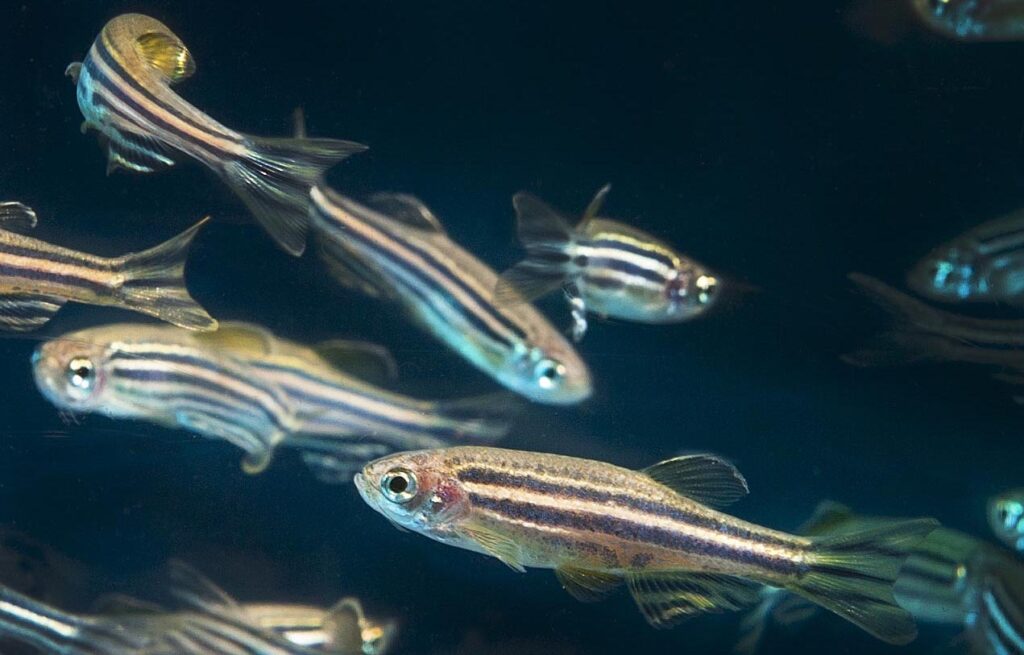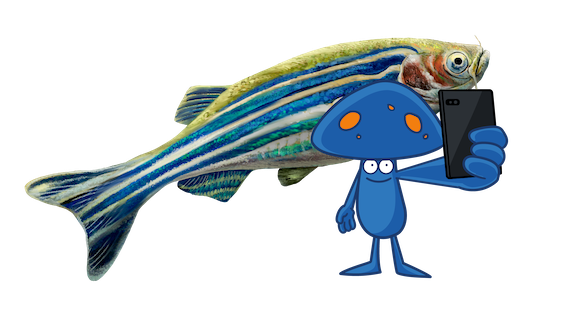Mice and rats tend to be the animal of choice when it comes to scientific research. With 97.5% of the same DNA as us humans, as well as the ability to multiply at speed, it makes sense. However, in a rather left-field new experiment, scientists have opted not to test on rodents, but rather on our aquatic friends — yep, they’ve been dosing fish with psilocybin!
And, as quirky as this may sound, it’s actually real top-shelf psychedelic research, published in Nature journal just last month. The study aimed to investigate the stimulatory and anxiolytic (stress relieving) qualities of psilocybin by analyzing its effects on the swimming pattern of zebrafish. And why zebrafish you might ask?
Why Give Zebrafish Psilocybin?
Well, recently these little minnows, named for their funky stripes, have become something of a darling in the research world. You see, these jazzy guys you’ve probably seen in your local pet store actually share 84% of genes that link to human diseases, and are even faster to reproduce than mice. They are also pretty social creatures (compared to other fish at least) meaning that researchers can infer similar results on human behavior. And to top it all off, they are semi-transparent, meaning researchers can literally see what’s going on in their bodies. It’s also very convenient that to administer a substance to a fish all you have to do is drop it into their water tank. So were these fish swimming around in what the psychonauts among us might call shroom tea? Well, kinda!

The researchers used machine tracking to analyze how psilocybin affects the swimming patterns of zebrafish. They wrote;
“Here, we developed a wide-field behavioral tracking system for larval zebrafish and investigated the effects of psilocybin, a psychedelic serotonin receptor agonist…”
“Machine learning analyses of precise body kinematics identified latent behavioral states reflecting spontaneous exploration, visually-driven rapid swimming, and irregular swim patterns following stress exposure.”
The Fish Were Either Stimulated or Calmed
The researchers described two distinct patterns in how psilocybin affected the fish in the study. These could be categorized into ‘stimulatory’ (meaning ‘to excite’) or ‘anxiolytic’ which is the word used to describe anti-anxiety medications. So, the fish were either excited or calmed. The researchers were also able to point to similarities between these results and previous research on how ketamine affects both zebrafish and humans.
“Using this method, we found that acute psilocybin treatment has two behavioral effects: facilitation of spontaneous exploration (“stimulatory”) and prevention of irregular swim patterns following stress exposure (“anxiolytic”). These effects differed from the effect of acute SSRI treatment and were rather similar to the effect of ketamine treatment,” the study said.
So how did these ‘stimulatory’ or ‘anxiolytic’ effects show themselves?
Well, the ‘stimulatory’ outcome was evident as the fish began exploring more of an area of the tank than they did when ‘sober’.
“Zebrafish typically swam near the wall in the small arena due to their innate preference called thigmotaxis. [After dosage] In our large arena, on the contrary, they explored widely and swam longer distances.”
And, in regard to the anxiolytic effects of psilocybin in zebrafish, the researchers measured this by dosing the fish and then, basically, trying to stress them out. Changing the tank temperature and pH levels rapidly, physically disturbing them, or keeping them in isolation. Usually this will cause a zebrafish to swim in a stressed-out “zig-zag” pattern. However, after psilocybin dosage the fish did not respond this way. This implies that the psilocybin was able to counteract their stress response, keeping them calm.
“We pre-treated fish with psilocybin with the most effective concentration for enhancing spontaneous exploration, exposed them to stressors for five min, recovered them at a normal temperature, and tested their spontaneous exploration and optomotor response…”
“Importantly, pre-treatment with psilocybin prevented stress-induced changes in swim patterns. Psilocybin-pretreated fish exhibited straight swim patterns even after the stress exposure.”
This result is especially exciting as it points towards psilocybin being an effective treatment to counteract stress, anxiety, and trauma, supporting previous research and hypothesis.

Not The First Psychedelic-Fish Study…
Additionally, this is not the first study, using zebrafish, to highlight the potential of psychedelics in the medicinal sphere. In 2022, researchers at MacEwan University studied the effects of giving zebrafish microdoses of LSD. From their observations they were able to surmise that LSD did not have an addictive potential for the fish, and thus, humans.
“In our first study, we repeatedly microdosed our zebrafish with LSD. Using behavioural neuroscience tests to quantify locomotion, boldness and anxiety-like behaviour, we observed no impact on behaviour after 10 days of repeated dosing…”
“Like with terpenes, this may suggest a lack of withdrawal symptoms or addictive potential, which is encouraging for clinically viability for use in humans.” (excerpt from The Conversation)
To compare, fish given ethanol or nicotine did exhibit increased anxiety-like behavior and decreased boldness. Basically, they were experiencing withdrawal. This did not happen for the fish given the psychedelic.

Each New Study Vindicates Psychedelics Potential
So, there you have it. With some help from some aquatic comrades we are able to vindicate further the therapeutic claims for psychedelics. With these two studies alone we are able to see the stimulating, mind opening qualities, the calming anti-anxiety effects, as well as the lack of addictive potential. Roll on more research!





